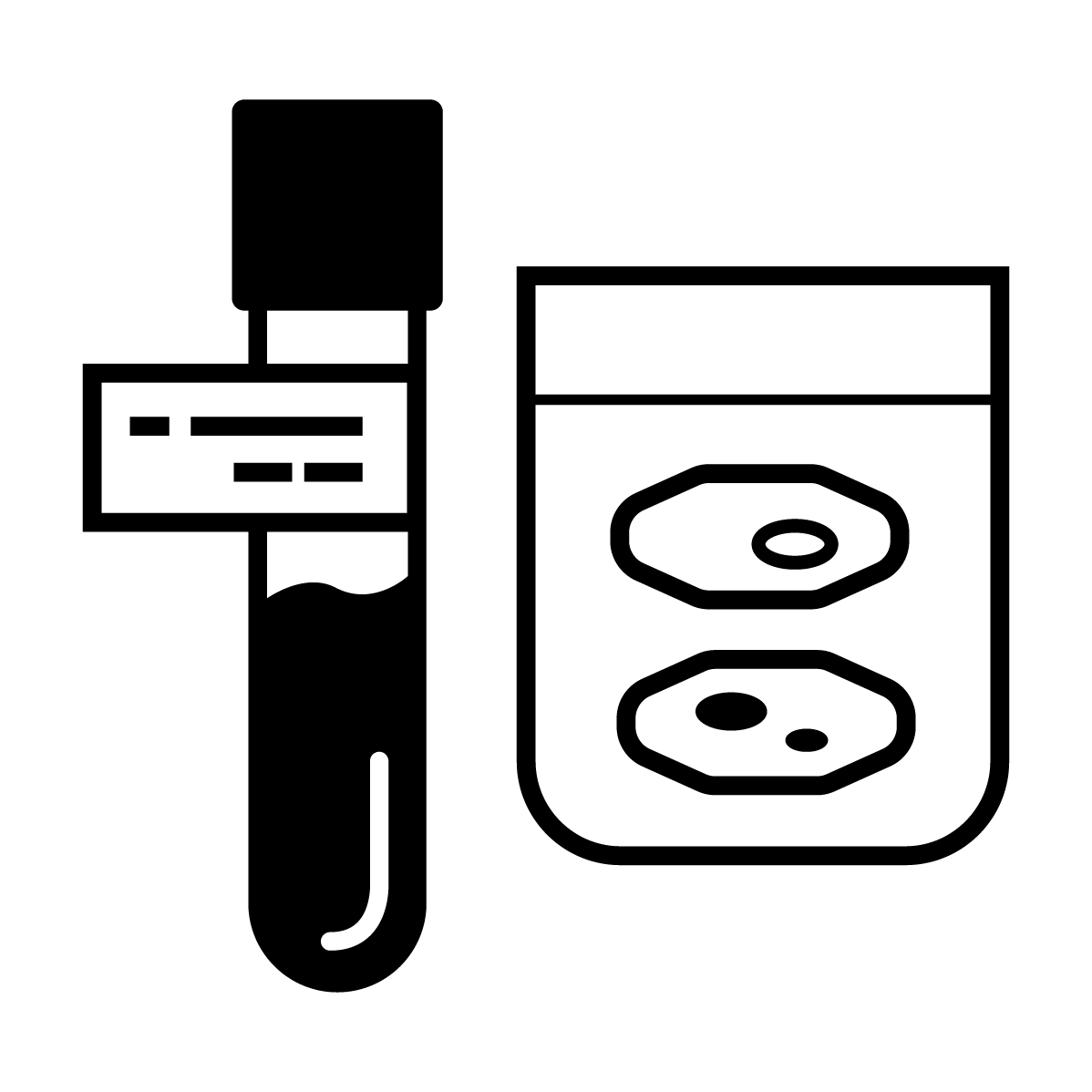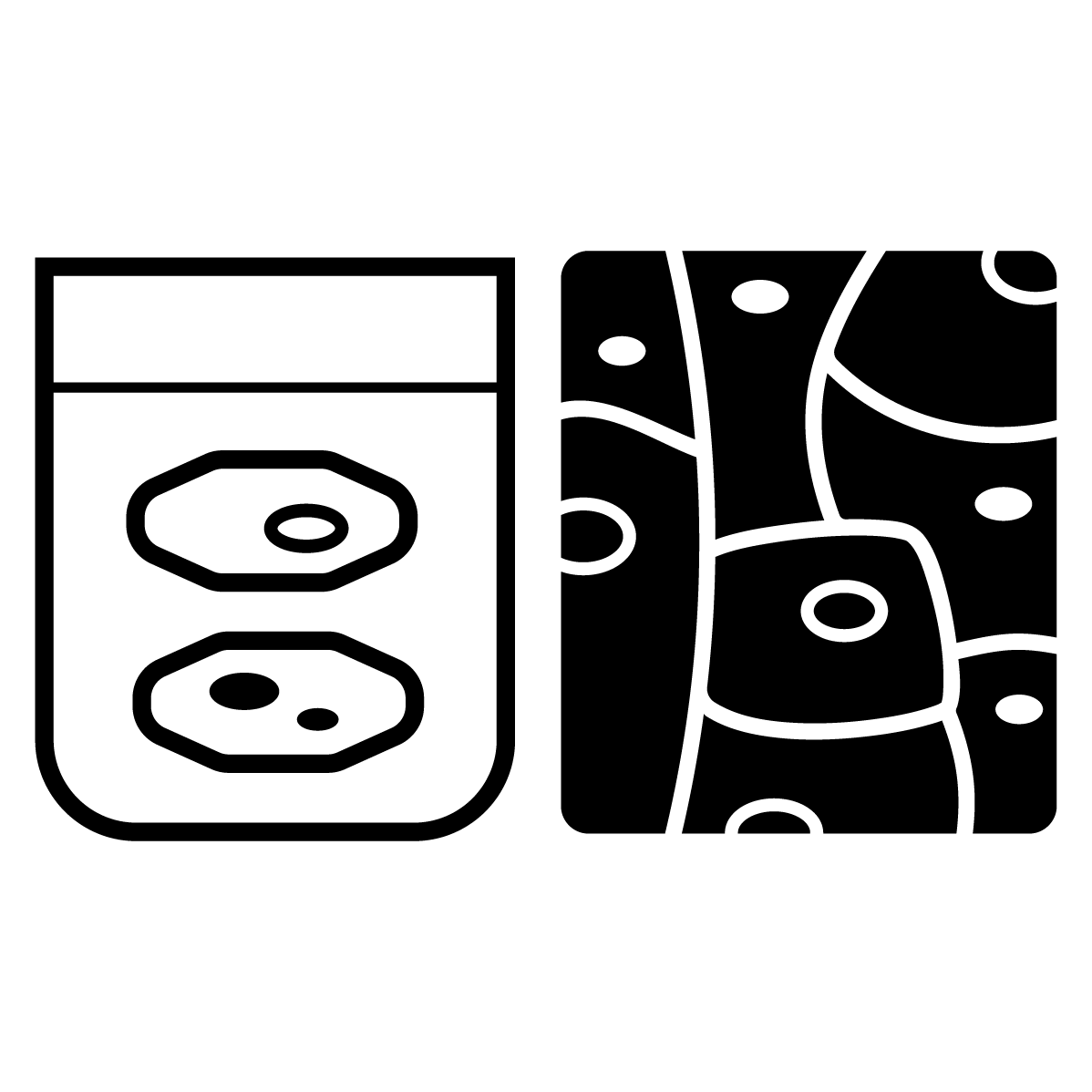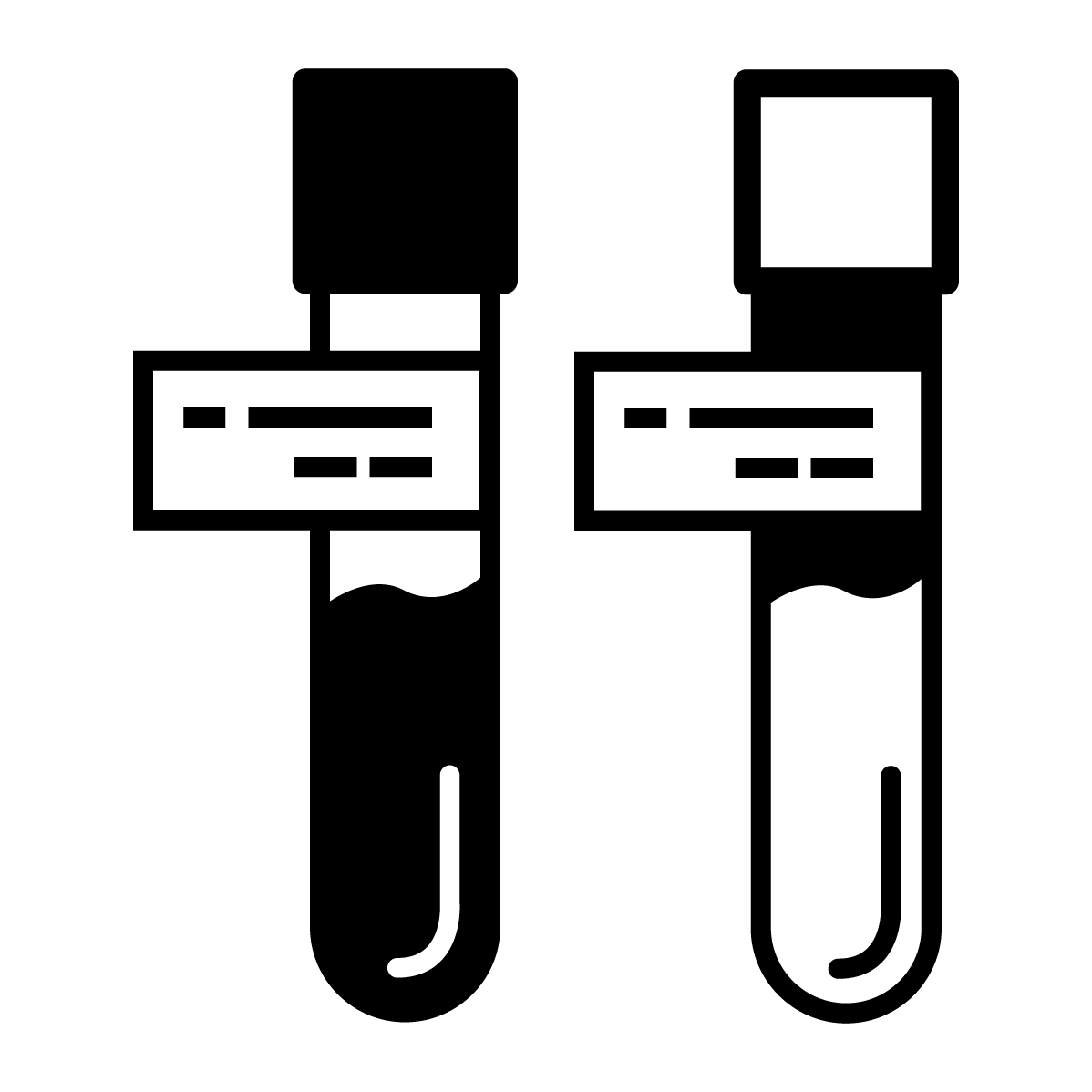

Matched Tissue and Blood Samples for Translational Research
Oncology, immunotherapy, and liquid biopsy researchers rely on uncompromising quality, and Precision delivers it run after run. Our global network and in-house, board-certified pathology team ensure every biospecimen meets the highest standards for research applications. And because we unite expertly sourced samples with advanced lab technologies and clinical trial expertise, you gain not just the right materials, but the insights and context to make every project more powerful.
Matched Tissue and Blood Sample Research Applications
- Biomarker discovery and validation
- Development of companion diagnostics
- Integrated omics research — including genomics, proteomics, transcriptomics, and multi-omics analysis
- Immuno-oncology research and liquid biopsy applications, such as tumor profiling and multi-cancer early detection (MCED)
-
Clinically relevant
Clinically relevant
Access paired tissue and blood samples from the same participant for accurate biomarker correlation and concordance testing.
-
Diverse formats
Diverse formats
Fresh, fresh frozen tissue, and FFPE samples — including frozen tissue — with matched plasma, serum, or whole blood.
-
Data-rich annotation
Data-rich annotation
Comprehensive patient demographics, medical history, diagnostic details, disease characterization and more. -
IRB-approved and ethically sourced
IRB-approved and ethically sourced
All samples are collected with patient consent and adhere to international regulatory standards. -
Informed by clinical expertise
Informed by clinical expertise
Each collection ensures data accuracy, supports trial endpoints, and meets regulatory standards while prioritizing patient integrity.
What's inside the cohorts?
Learn more about our inventory platform and build your unique cohort tailored to your research question
/tissues-overview-hero.webp?width=1440&height=460&name=tissues-overview-hero.webp)
Integrated Quality You Can Trust
-
Every sample evaluated by a board-certified pathologist
-
Comprehensive data annotation for actionable insights
-
End-to-end digital pathology, immunohistochemistry (IHC), and molecular services
- Additional downstream applications, like FFPE RNA extraction and FFPE RNA isolation, for transcriptomic and molecular analysis
Backed by Precision’s clinical trial expertise to ensure compliance, scalability, and research-readiness.
Matched Tissue and Blood That Maximize Discovery
We offer four distinct types of matched tissue and blood sets, each designed to unlock deeper insights through integrated lab services like sequencing, molecular profiling, and advanced analytics.

Matched Tissue + Blood
(Tumor + biofluids from same participant)

Matched Tissue Sets
(Tumor samples + NAT from same participant)

Matched Biofluids Sets
(Whole blood + other biofluids or derivatives from same participant)

Custom Matched Collections
(Tissue + blood for rare indications)Connecting Biology to Breakthroughs with
High-Quality Matched Tissue and Blood Samples
-
Explore


Human Tissue Samples
ExplorePrecision's team of on-site pathologists and laboratory specialists bring you the highest-quality tissue samples, customized to meet your downstream applications
Human Tissue Samples
ExplorePrecision's team of on-site pathologists and laboratory specialists bring you the highest-quality tissue samples, customized to meet your downstream applications -
Explore
/blood-cta-banner.webp?width=396&height=416&name=blood-cta-banner.webp)

Biofluids
ExploreDiscover Precision's blood and biofluids products, available to ship from inventory or through custom collections to meet your specific needs
Biofluids
ExploreDiscover Precision's blood and biofluids products, available to ship from inventory or through custom collections to meet your specific needs -
Explore


NGS Characterized Biospecimens
ExploreServices including RNA-seq, whole exome sequencing, and targeted DNA/RNA sequencing utilizing both Illumina and Thermo-Fisher NGS platforms
NGS Characterized Biospecimens
ExploreServices including RNA-seq, whole exome sequencing, and targeted DNA/RNA sequencing utilizing both Illumina and Thermo-Fisher NGS platforms

MIRROR COHORT (LIMITED ACCESS)
Matched & Integrated Repository for Rediscovered Oncology Research
Bridge the past and future of oncology discovery with mirrored twin biospecimens, cut from the same tissue blocks that contributed to landmark projects from the Cancer Genome Atlas (TCGA) and Expression Project for Oncology (expO). These specimens are uniquely paired with biofluid, creating a comprehensive resource for advanced research.
Ask & Answer New Questions, 20 Years of Biotechnology Innovation in the Making.
These ultra-rare, participant-linked samples connect decades of genomic data to physical tissue, enabling researchers to apply AI, spatial, and multi-omic assays to the very materials that defined precision medicine.

What will you find when you look into the MIRROR?
From archived blocks to annotated molecular profiles, MIRROR transforms historic insight into a modern platform for biomarker discovery, drug development, and diagnostic innovation.
Matched Sample Basics & Application FAQs
What are matched tissue and blood samples?
These are biospecimens collected from the same participant, enabling researchers to correlate tissue-based and blood-based biomarkers for more accurate insights.
What cancer indications are available for matched samples?
Our inventory is routinely updated to offer a range of matched cancer indications that are ready-to-ship including:
- Bladder
- Bone & Soft Tissue
- Brain
- Breast
- Colorectal
- Esophageal
- Gastric
- Head & Neck
- Hodgkin Lymphoma
- Liver
- Lung
- Non-Hodgkin Lymphoma
- Ovarian
- Pancreatic
- Prostate
- Skin
- Uterine
Custom collections also are available to source other disease types needed for your project.
How quickly can I receive matched samples?
Many samples are ready-to-ship from our inventory. Custom collections also are available through our global clinical network to get you exactly what you need.
Are the samples ethically sourced?
Yes, all samples are IRB-approved and collected with informed consent.
For biomarker discovery and validation, what is the use of matched tissue and blood samples?
- Cross-Validation of Biomarkers
- Validating circulating biomarkers (i.e., ctDNA, proteins, metabolites) against the actual tumor biology ensures that blood-based markers truly reflect disease status.
- Translational Relevance
- Matched samples help determine whether a candidate biomarker is clinically actionable and detectable in a real-world, non-invasive setting (blood), while still being biologically validated in tissue.
- Supporting Multi-Omics Integration
- Matched samples allow integration of genomic, transcriptomic, proteomic, and metabolomic data from tissue and blood. This helps identify robust biomarker signatures and understand systemic vs. tumor-localized changes.
For companion diagnostic development (CDx), what is the use of matched tissue and blood samples?
- Biomarker Identification and Assay Development1
- Tissue samples provide the primary source of tumor-specific biomarkers (i.e., HER2, EGFR, ALK), which are essential for developing assays that predict response to targeted therapies. Blood samples (liquid biopsy) allow researchers to determine if these biomarkers can also be detected in a minimally invasive format, supporting the development of blood-based CDx for patients who cannot undergo tissue biopsy.
- Clinical Validation and Concordance Testing2
- Regulatory agencies (like the FDA) require the CDx assay to demonstrate clinical validity (i.e., the biomarker detected by the test correlates with treatment response)
- Matched tissue and blood samples enable concordance studies, comparing biomarker detection in tissue (gold standard) versus blood, ensuring accuracy and reliability before approval.
- Co-Development with Therapeutics2
- CDx and drug development are ideally synchronized. Matched samples collected during clinical trials allow developers to:
- Stratify patients based on biomarker status
- Monitor treatment response using both tissue and blood markers
- Transition from research-use-only assays to validated in vitro diagnostics for regulatory submission
For omics research, what is the use of matched tissue and blood samples?
- Genomic Analysis
- Tissue DNA provides the reference for tumor-specific mutations, copy number variations, and structural alterations.
- Blood DNA (cfDNA/ctDNA) allows detection of these alterations in a minimally invasive way, enabling:
- Validation of whether tumor mutations are detectable in circulation.
- Monitoring of tumor evolution and treatment response over time.
- Transcriptomic Analysis
- Tissue RNA reveals gene expression profiles within the tumor microenvironment.
- Blood RNA (i.e., from plasma) helps identify circulating transcripts and non-coding RNAs that reflect systemic changes.
- Matching both sources allows correlation of tumor-localized expression with circulating RNA signatures, improving biomarker discovery.
- Proteomic Analysis
- Tissue proteomics captures protein abundance and post-translational modifications in the tumor.
- Blood proteomics identifies secreted proteins, cytokines, and signaling molecules that can serve as non-invasive biomarkers.
- Matched samples enable cross-validation of candidate proteins and help distinguish tumor-derived signals from background noise.
- Multi-Omics Integration
- Combining genomic, transcriptomic, and proteomic data from matched tissue and blood:
- Improves biological interpretation of pathways and networks.
- Identifies robust biomarker panels for diagnosis, prognosis, and therapy response.
- Supports systems biology models linking tumor biology to systemic effects
For liquid biopsy research, what is the use of matched tissue and blood samples?
- Improving Accuracy of Mutation Detection1
- Tumor-normal matched sequencing compares tumor DNA (from tissue) with normal DNA (from blood, typically white blood cells). This helps filter out germline variants and clonal hematopoiesis (CHIP) mutations, which can otherwise be misclassified as tumor-specific mutations in liquid biopsy results. This dramatically reduces false positives and ensures only true somatic mutations are reported.
- Enhancing Clinical Actionability1
- Studies show that matched sequencing improves the detection of clinically actionable variants. For example, in one study, tumor-matched sequencing identified actionable alterations in 73% of cases and filtered out over 10,000 non-tumor variants that could have led to incorrect treatment decisions.
- Comprehensive Genomic Profiling2
- Combining tissue and liquid biopsy analysis increases the yield of actionable variants and can uncover hereditary cancer predispositions. Some germline mutations (i.e., BRCA1, ATM) would be missed without this integrated approach. It also allows for longitudinal monitoring of circulating tumor DNA (ctDNA) during treatment, which is essential for detecting resistance mutations and early relapse.
- Assay Development and Validation3
- For developing and validating liquid biopsy assays, matched tissue and blood samples collected close in time are critical. They help assess the sensitivity and specificity of the assay by providing a ground truth reference from the tumor tissue against which liquid biopsy results can be compared.
Key types of disease-state biospecimens
Precision offers human biospecimens in many therapeutic areas and indications, with a strong focus in oncology, autoimmune, and infectious disease biospecimens.










